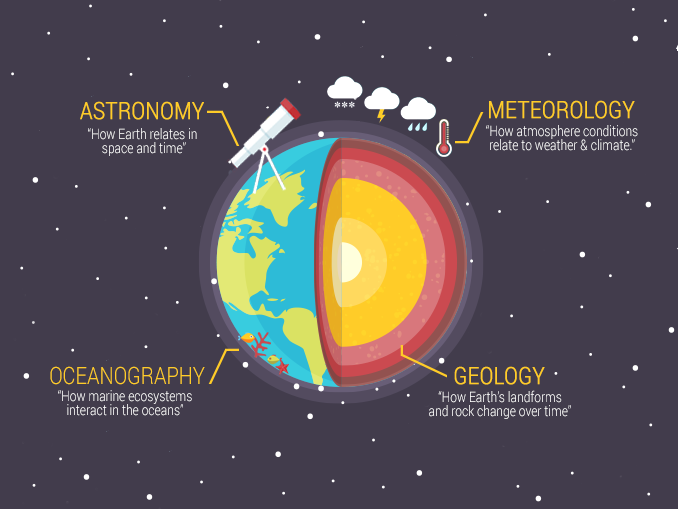Earth science or geoscience includes all fields of natural science related to the planet Earth. This is a branch of science dealing with the physical and chemical constitution of the Earth and its atmosphere and oceans and it’s interactions in space.

Geology: Science of the Earth
Geology is the primary Earth science. The word means “study of the Earth.” Geology deals with the composition of Earth materials, Earth structures, and Earth processes. It is also concerned with the organisms of the planet and how the planet has changed over time. Geologists search for fuels and minerals, study natural hazards, and work to protect Earth’s environment.
Meteorology: Science of the Atmosphere
Meteorology is the study of the atmosphere and how processes in the atmosphere determine Earth’s weather and climate. Meteorology is a very practical science because everyone is concerned about the weather. How climate changes over time in response to the actions of people is a topic of urgent worldwide concern. The study of meteorology is of critical importance in protecting Earth’s environment.
Oceanography: Science of the Oceans
Oceanography is the study of Earth’s oceans – their composition, movement, organisms and processes. The oceans cover most of our planet and are important resources for food and other commodities. They are increasingly being used as an energy source. The oceans also have a major influence on the weather, and changes in the oceans can drive or moderate climate change. Oceanographers work to develop the ocean as a resource and protect it from human impact. The goal is to utilize the oceans while minimizing the effects of our actions.
Astronomy: Science of the Universe
Astronomy is the study of the universe. Here are some examples of why studying space beyond Earth is important: the moon drives the ocean’s tidal system, asteroid impacts have repeatedly devastated Earth’s inhabitants, and energy from the sun drives our weather and climates. A knowledge of astronomy is essential to understanding the Earth. Astronomers can also use a knowledge of Earth materials, processes and history to understand other planets – even those outside of our own solar system.

